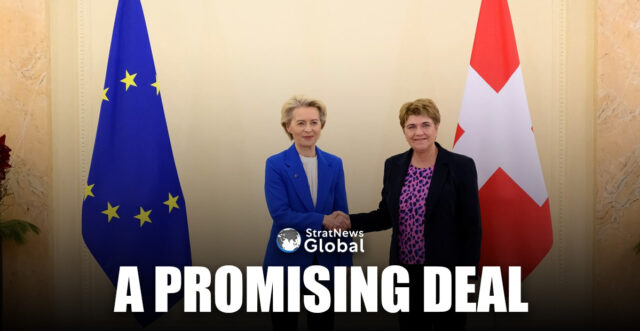Switzerland and the European Union on Friday unveiled a deal to carry out the biggest overhaul of their trade ties in years.
The agreement will help in overcoming Swiss concerns regarding immigration and setting the scene for a fraught and lengthy approval process.
The accord covers everything from electricity to State aid, transport and freedom of movement, in addition to Bern’s financial contribution to the bloc.
It also brings the EU and its fourth-biggest export market closer and gives added certainty to Swiss companies that rely heavily on the 27-nation alliance for business.
Though it faces big tests before ratification, the deal is a step forward from the last bid.
The last bid failed in 2021 when Bern abruptly pulled out.
It also delivers a boost to the EU as it tries to move past Britain’s 2016 vote to exit the bloc.
Swiss President Viola Amherd and the President of the European Commission, Ursula von der Leyen, announced the agreement at a hastily-convened joint news conference in Bern.
“Today is a milestone for the stabilization and further development of bilateral relations,” said Amherd, the head of Switzerland’s seven-member executive, the Federal Council.
Von der Leyen described the agreement as “historic” and vital given geopolitical turmoil.
“In Switzerland as well as in our 27 member states, in this challenging environment, strong partnerships like ours are not just an advantage, they’re a must,” she said.
Beginning in March, the negotiations delved into contentious areas of sovereignty such as how to resolve disputes where Swiss and EU law diverge in a bilateral trade relationship worth some 300 billion Swiss francs ($338 billion) annually.
Swiss engineering group ABB hailed the outcome, which it expects to provide “legal certainty and stability” for Swiss firms, particularly those oriented towards the EU.
Per capita, Switzerland is wealthier than most countries in the bloc, which is easily the Alpine nation’s top trade partner.
Under the deal, its annual payment towards the EU will stay at 130 million Swiss francs ($145 million) in a transitional phase to the end of 2029.
Then, from 2030 it will rise to 350 million francs through 2036, the Swiss government said.
Switzerland’s economic ties with what is now the EU were built on a 1972 free trade deal subsequently expanded by multiple agreements.
But those accords have begun to age, with some expiring as Europe updates its own regulations.
At the heart of the negotiations has been agreeing on so-called “dynamic alignment” of laws, under which Switzerland is obliged, pending its own constitutional safeguards, to adapt its legislation to relevant ongoing changes in EU law.
Switzerland secured a mechanism with the EU that could let it control immigration from the bloc under exceptional circumstances, subject to a process of joint arbitration.
Opposition to the EU has come on the right from critics warning about sharp Swiss population growth, and on the left from trade unions worried about wages coming under pressure.
During a Press conference setting out the accords, three Swiss federal councillors were repeatedly asked to explain how the immigration curb would work and whether they were enthusiastic about the deal.
“The Federal Council views stable, predictable relations with neighbouring countries and the EU as a strategic necessity, especially in these very turbulent geopolitical times,” Swiss Foreign Minister Ignazio Cassis said.
The new deal must still be approved by the Swiss and European parliaments and is almost certain to face a public referendum in Switzerland, where powerful critics are marshalling their forces to reject it.
European Trade Commissioner Maros Sefcovic said the agreement will bring benefits to Switzerland on research, health and air freight, and that it could take effect in 2028 or 2029.
If the agreement is not approved, relations between the two sides would likely suffer, he said.
“Our cooperation would over the time be smaller, would degrade, would be more difficult,” Sefcovic said.
(With inputs from Reuters)





